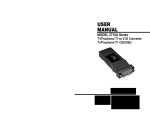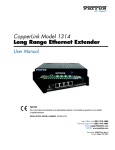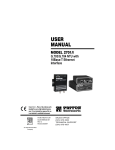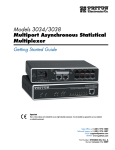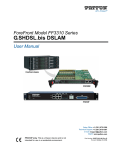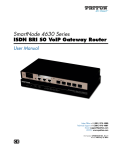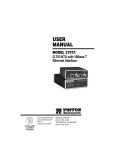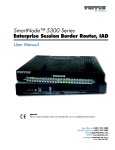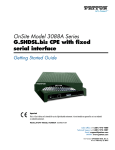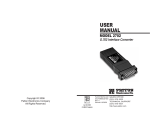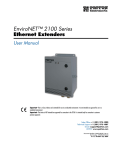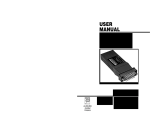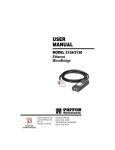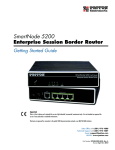Download Patton electronic T1/E1 User's Manual
Transcript
For Quick Start Installation OnSite 2884 T1/E1 Channelized Gigabit Router User Manual Important This is a Class A device and is intended for use in a light industrial environment. It is not intended nor approved for use in an industrial or residential environment. Sales Office: +1 (301) 975-1000 Technical Support: +1 (301) 975-1007 E-mail: [email protected] WWW: www.patton.com Part Number: 07M2884-GS, Rev. E Revised: February 23, 2012 Patton Electronics Company, Inc. 7622 Rickenbacker Drive Gaithersburg, MD 20879 USA Tel: +1 (301) 975-1000 Fax: +1 (301) 869-9293 Support: +1 (301) 975-1007 Web: www.patton.com E-mail: [email protected] Trademark Statement The term OnSite is a trademark of Patton Electronics Company. All other trademarks presented in this document are the property of their respective owners. Copyright © 2012, Patton Electronics Company. All rights reserved. The information in this document is subject to change without notice. Patton Electronics assumes no liability for errors that may appear in this document. Important Information To use virtual private network (VPN) and/or AES/DES/3DES encryption capabilities with the OnSite 2884, you may need to purchase additional licenses, hardware, software, network connection, and/or service. Contact [email protected] or +1 (301) 975-1000 for assistance. Warranty Information The software described in this document is furnished under a license and may be used or copied only in accordance with the terms of such license. For information about the license, see Appendix E, "End user license agreement" on page 49 or go to www.patton.com. Patton Electronics warrants all OnSite router components to be free from defects, and will—at our option—repair or replace the product should it fail within one year from the first date of the shipment. This warranty is limited to defects in workmanship or materials, and does not cover customer damage, abuse or unauthorized modification. If the product fails to perform as warranted, your sole recourse shall be repair or replacement as described above. Under no condition shall Patton Electronics be liable for any damages incurred by the use of this product. These damages include, but are not limited to, the following: lost profits, lost savings and incidental or consequential damages arising from the use of or inability to use this product. Patton Electronics specifically disclaims all other warranties, expressed or implied, and the installation or use of this product shall be deemed an acceptance of these terms by the user. Summary Table of Contents 1 General information ...................................................................................................................................... 13 2 Applications overview.................................................................................................................................... 19 3 OnSite installation ........................................................................................................................................ 21 4 Initial configuration ...................................................................................................................................... 28 5 Contacting Patton for assistance ................................................................................................................... 32 A Compliance information .............................................................................................................................. 35 B Specifications ................................................................................................................................................ 38 C Cabling ......................................................................................................................................................... 41 D Port pin-outs ................................................................................................................................................ 46 E End user license agreement ........................................................................................................................... 49 3 Table of Contents Summary Table of Contents ........................................................................................................................... 3 Table of Contents ........................................................................................................................................... 4 List of Figures ................................................................................................................................................. 7 List of Tables .................................................................................................................................................. 8 About this guide ............................................................................................................................................. 9 Audience................................................................................................................................................................. 9 Structure................................................................................................................................................................. 9 Precautions ........................................................................................................................................................... 10 Safety when working with electricity ...............................................................................................................11 General observations .......................................................................................................................................12 Typographical conventions used in this document................................................................................................ 12 General conventions .......................................................................................................................................12 1 General information ...................................................................................................................................... 13 OnSite Model 2884 Overview...............................................................................................................................14 Features and Benefits.............................................................................................................................................15 Model 2884 Features ......................................................................................................................................15 Rear and Front Panels ...........................................................................................................................................16 OnSite 2884 rear panel ...................................................................................................................................16 OnSite 2884 front panel .................................................................................................................................18 2 Applications overview.................................................................................................................................... 19 Typical OnSite 2884 Application ..........................................................................................................................20 3 OnSite installation ........................................................................................................................................ 21 Planning the installation........................................................................................................................................22 Site log ............................................................................................................................................................22 Network information ......................................................................................................................................22 Network Diagram ...........................................................................................................................................22 IP related information .....................................................................................................................................23 Software tools .................................................................................................................................................23 Power source ...................................................................................................................................................23 Location and mounting requirements .............................................................................................................23 Installing the OnSite 2884 ....................................................................................................................................23 Placing the OnSite ..........................................................................................................................................23 Installing cables ...............................................................................................................................................24 Connecting the T1/E1 ports .....................................................................................................................24 Connecting the 10/100/1000Base-T Ethernet LAN and WAN cables ......................................................24 Connecting the power supply ....................................................................................................................25 Internal AC Power Supply ..................................................................................................................25 External AC Power Supply .................................................................................................................26 External DC Power Supply .................................................................................................................27 4 OnSite Model 2884 User Manual Table of Contents Internal DC Power Supply. ................................................................................................................27 4 Initial configuration ...................................................................................................................................... 28 Introduction ..........................................................................................................................................................29 1. Connecting the OnSite to your PC ...................................................................................................................29 Connecting and logging in via the Ethernet port .............................................................................................29 Connecting and logging in via the Console port .............................................................................................30 2. Configuring the desired IP address ....................................................................................................................30 Factory-default IP settings ...............................................................................................................................30 Login ..............................................................................................................................................................31 Changing the IP address .................................................................................................................................31 3. Connecting the OnSite to the network..............................................................................................................31 5 Contacting Patton for assistance ................................................................................................................... 32 Introduction ..........................................................................................................................................................33 Contact information..............................................................................................................................................33 Patton support headquarters in the USA .........................................................................................................33 Alternate Patton support for Europe, Middle East, and Africa (EMEA) ..........................................................33 Warranty Service and Returned Merchandise Authorizations (RMAs)...................................................................33 Warranty coverage ..........................................................................................................................................33 Out-of-warranty service .............................................................................................................................34 Returns for credit ......................................................................................................................................34 Return for credit policy .............................................................................................................................34 RMA numbers ................................................................................................................................................34 Shipping instructions ................................................................................................................................34 A Compliance information .............................................................................................................................. 35 Compliance ...........................................................................................................................................................36 EMC ...............................................................................................................................................................36 Safety ..............................................................................................................................................................36 PSTN Regulatory ............................................................................................................................................36 Radio and TV Interference ....................................................................................................................................36 FCC Part 68 (ACTA) Statement ...........................................................................................................................36 Industry Canada Notice ........................................................................................................................................37 CE Declaration of Conformity ..............................................................................................................................37 Authorized European Representative .....................................................................................................................37 B Specifications ................................................................................................................................................ 38 WAN Ports ...........................................................................................................................................................39 Ethernet Ports .......................................................................................................................................................39 Management .........................................................................................................................................................39 Protocols ...............................................................................................................................................................39 Security .................................................................................................................................................................40 Power Supply ........................................................................................................................................................40 Physical .................................................................................................................................................................40 C Cabling ......................................................................................................................................................... 41 5 OnSite Model 2884 User Manual Table of Contents Introduction ..........................................................................................................................................................42 Console .................................................................................................................................................................42 Ethernet ................................................................................................................................................................43 E1 Port..................................................................................................................................................................44 T1 Port..................................................................................................................................................................45 D Port pin-outs ................................................................................................................................................ 46 Introduction ..........................................................................................................................................................47 Console port..........................................................................................................................................................47 Ethernet ................................................................................................................................................................48 T1/E1 port ............................................................................................................................................................48 E End user license agreement ........................................................................................................................... 49 End User License Agreement .................................................................................................................................50 1. Definitions ..................................................................................................................................................50 2. Title ............................................................................................................................................................50 3. Term ...........................................................................................................................................................50 4. Grant of License ..........................................................................................................................................50 5. Warranty ....................................................................................................................................................50 6. Termination ................................................................................................................................................51 7. Other licenses .............................................................................................................................................51 6 List of Figures 1 2 3 4 5 6 7 8 9 10 11 12 13 14 15 16 17 18 19 OnSite Model 2884 . . . . . . . . . . . . . . . . . . . . . . . . . . . . . . . . . . . . . . . . . . . . . . . . . . . . . . . . . . . . . . . . . . . . . 14 2884 rear panel . . . . . . . . . . . . . . . . . . . . . . . . . . . . . . . . . . . . . . . . . . . . . . . . . . . . . . . . . . . . . . . . . . . . . . . . . 16 OnSite 2884 front panel . . . . . . . . . . . . . . . . . . . . . . . . . . . . . . . . . . . . . . . . . . . . . . . . . . . . . . . . . . . . . . . . . . 18 Typical application for OnSite Model 2884 . . . . . . . . . . . . . . . . . . . . . . . . . . . . . . . . . . . . . . . . . . . . . . . . . . . 20 2884 rear panel . . . . . . . . . . . . . . . . . . . . . . . . . . . . . . . . . . . . . . . . . . . . . . . . . . . . . . . . . . . . . . . . . . . . . . . . . 25 Power LED . . . . . . . . . . . . . . . . . . . . . . . . . . . . . . . . . . . . . . . . . . . . . . . . . . . . . . . . . . . . . . . . . . . . . . . . . . . . 25 Power connector location on rear panel . . . . . . . . . . . . . . . . . . . . . . . . . . . . . . . . . . . . . . . . . . . . . . . . . . . . . . 26 Connecting DC Power to the 2884 DC Power Supply . . . . . . . . . . . . . . . . . . . . . . . . . . . . . . . . . . . . . . . . . . . 27 Internal 48VDC power connection . . . . . . . . . . . . . . . . . . . . . . . . . . . . . . . . . . . . . . . . . . . . . . . . . . . . . . . . . 27 Connecting the OnSite to your laptop PC via the Ethernet port . . . . . . . . . . . . . . . . . . . . . . . . . . . . . . . . . . . . 29 Connecting the OnSite to your laptop PC via the console port . . . . . . . . . . . . . . . . . . . . . . . . . . . . . . . . . . . . . 30 Connecting a serial terminal . . . . . . . . . . . . . . . . . . . . . . . . . . . . . . . . . . . . . . . . . . . . . . . . . . . . . . . . . . . . . . . 42 Typical Ethernet straight-through cable diagram for 10/100Base-T . . . . . . . . . . . . . . . . . . . . . . . . . . . . . . . . . 43 Typical Ethernet straight-through cable diagram for 1000Base-T . . . . . . . . . . . . . . . . . . . . . . . . . . . . . . . . . . . 43 Connecting an E1 port to an NT1 . . . . . . . . . . . . . . . . . . . . . . . . . . . . . . . . . . . . . . . . . . . . . . . . . . . . . . . . . . 44 E1 port crossover cable . . . . . . . . . . . . . . . . . . . . . . . . . . . . . . . . . . . . . . . . . . . . . . . . . . . . . . . . . . . . . . . . . . . 44 Connecting a T1 port to an NT device . . . . . . . . . . . . . . . . . . . . . . . . . . . . . . . . . . . . . . . . . . . . . . . . . . . . . . . 45 T1 crossover cable . . . . . . . . . . . . . . . . . . . . . . . . . . . . . . . . . . . . . . . . . . . . . . . . . . . . . . . . . . . . . . . . . . . . . . . 45 EIA-561 (RJ-45 8-pin) port . . . . . . . . . . . . . . . . . . . . . . . . . . . . . . . . . . . . . . . . . . . . . . . . . . . . . . . . . . . . . . . 47 7 List of Tables 1 2 3 4 5 6 7 8 9 General conventions . . . . . . . . . . . . . . . . . . . . . . . . . . . . . . . . . . . . . . . . . . . . . . . . . . . . . . . . . . . . . . . . . . . . . 12 OnSite 2884 Model Codes . . . . . . . . . . . . . . . . . . . . . . . . . . . . . . . . . . . . . . . . . . . . . . . . . . . . . . . . . . . . . . . . 15 Rear panel ports . . . . . . . . . . . . . . . . . . . . . . . . . . . . . . . . . . . . . . . . . . . . . . . . . . . . . . . . . . . . . . . . . . . . . . . . 17 LED Descriptions . . . . . . . . . . . . . . . . . . . . . . . . . . . . . . . . . . . . . . . . . . . . . . . . . . . . . . . . . . . . . . . . . . . . . . 18 Sample site log entries . . . . . . . . . . . . . . . . . . . . . . . . . . . . . . . . . . . . . . . . . . . . . . . . . . . . . . . . . . . . . . . . . . . . 22 Factory default IP address and network mask configuration . . . . . . . . . . . . . . . . . . . . . . . . . . . . . . . . . . . . . . . 30 RJ45 socket 10/100Base-T . . . . . . . . . . . . . . . . . . . . . . . . . . . . . . . . . . . . . . . . . . . . . . . . . . . . . . . . . . . . . . . . 48 RJ45 socket 1000Base-T . . . . . . . . . . . . . . . . . . . . . . . . . . . . . . . . . . . . . . . . . . . . . . . . . . . . . . . . . . . . . . . . . . 48 RJ-45 socket . . . . . . . . . . . . . . . . . . . . . . . . . . . . . . . . . . . . . . . . . . . . . . . . . . . . . . . . . . . . . . . . . . . . . . . . . . . 48 8 About this guide This guide describes the OnSite 2884 hardware, installation and basic configuration. Audience This guide is intended for the following users: • Operators • Installers • Maintenance technicians Structure This guide contains the following chapters and appendices: • • • • • • • • • • Chapter 1 on page 13 provides information about router features and capabilities Chapter 2 on page 19 contains an overview describing router operation and applications Chapter 3 on page 21 provides hardware installation procedures Chapter 4 on page 28 provides quick-start procedures for configuring the OnSite router Chapter 5 on page 32 contains information on contacting Patton technical support for assistance Appendix A on page 35 contains compliance information for the router Appendix B on page 38 contains specifications for the routers Appendix C on page 41 provides cable recommendations Appendix D on page 46 describes the router’s ports and pin-outs Appendix E on page 49 provides license information that describes acceptable usage of the software provided with the OnSite 2884 For best results, read the contents of this guide before you install the router. 9 OnSite Model 2884 User Manual Precautions Notes, cautions, and warnings, which have the following meanings, are used throughout this guide to help you become aware of potential problems. Warnings are intended to prevent safety hazards that could result in personal injury. Cautions are intended to prevent situations that could result in property damage or impaired functioning. Note A note presents additional information or interesting sidelights. The alert symbol and IMPORTANT heading calls attention to important information. IMPORTANT The alert symbol and CAUTION heading indicate a potential hazard. Strictly follow the instructions to avoid property damage. CAUTION The shock hazard symbol and CAUTION heading indicate a potential electric shock hazard. Strictly follow the instructions to avoid property damage caused by electric shock. CAUTION The alert symbol and WARNING heading indicate a potential safety hazard. Strictly follow the warning instructions to avoid personal injury. WARNING WARNING The shock hazard symbol and WARNING heading indicate a potential electric shock hazard. Strictly follow the warning instructions to avoid injury caused by electric shock. 10 OnSite Model 2884 User Manual Safety when working with electricity WARNING WARNING WARNING WARNING The OnSite contains no user serviceable parts. The equipment shall be returned to Patton Electronics for repairs, or repaired by qualified service personnel. Mains Voltage: Line voltages are present when the power cord is connected. The mains outlet shall be within 10 feet (3 meters) of the device, shall be easily accessible, and protected by a circuit breaker. For AC powered units, ensure that the power cable used meets all applicable standards for the country in which it is to be installed, and that it is connected to a wall outlet which has earth ground. Hazardous network voltages are present in WAN ports regardless of whether power to the OnSite is ON or OFF. To avoid electric shock, use caution when near WAN ports. When detaching cables, detach the end away from the OnSite first. Do not work on the system or connect or disconnect cables during periods of lightning activity. WARNING For units with an external power adapter, the adapter shall be a listed Limited Power Source. WARNING WARNING Ensure that the power cable shipped with this device meets all applicable standards for the country in which it is to be installed. If it is not, refer to chapter Chapter 5, “Contacting Patton for assistance” on page 32 for help in replacing it with a compliant cable. In accordance with the requirements of council directive 2002/ 96/EC on Waste of Electrical and Electronic Equipment (WEEE), ensure that at end-of-life you separate this product from other waste and scrap and deliver to the WEEE collection system in your country for recycling. 11 OnSite Model 2884 User Manual General observations • Clean the case with a soft slightly moist anti-static cloth • Place the unit on a flat surface and ensure free air circulation • Avoid exposing the unit to direct sunlight and other heat sources • Protect the unit from moisture, vapors, and corrosive liquids Typographical conventions used in this document This section describes the typographical conventions and terms used in this guide. General conventions The procedures described in this manual use the following text conventions: Table 1. General conventions Convention Garamond blue type Meaning Indicates a cross-reference hyperlink that points to a figure, graphic, table, or section heading. Clicking on the hyperlink jumps you to the reference. When you have finished reviewing the reference, click on the Go to Previous View button in the Adobe® Acrobat® Reader toolbar to return to your starting point. Futura bold type Commands and keywords are in boldface font. Futura bold-italic type Parts of commands, which are related to elements already named by the user, are in boldface italic font. Italicized Futura type Variables for which you supply values are in italic font Futura type Indicates the names of fields or windows. Garamond bold type Indicates the names of command buttons that execute an action. <> Angle brackets indicate function and keyboard keys, such as <SHIFT>, <CTRL>, <C>, and so on. [] Elements in square brackets are optional. {a | b | c} Alternative but required keywords are grouped in braces ({ }) and are separated by vertical bars ( | ) screen Terminal sessions and information the system displays are in screen font. node The leading IP address or nodename of a OnSite is substituted with node in boldface italic font. SN The leading SN on a command line represents the nodename of the OnSite # An hash sign at the beginning of a line indicates a comment line. 12 Chapter 1 General information Chapter contents IpLink Model 2884 Overview ...............................................................................................................................14 Features and Benefits.............................................................................................................................................15 Model 2884 Features ......................................................................................................................................15 Rear and Front Panels ...........................................................................................................................................16 IpLink 2884 rear panel ...................................................................................................................................16 IpLink 2884 front panel ..................................................................................................................................18 13 OnSite Model 2884 User Manual 1 • General information OnSite Model 2884 Overview The Model 2884 Series T1/E1 Channelized Gigabit Routers (figure 1) are a family of multi-media routers that terminate up to 124 PPP channels as well as perform Layer 2 bonding of T1/E1 WAN ports with multi-link PPP. Dual Gigabit Ethernet ports ensure connection to any LAN infrastructure. The OnSite™ Channelized Gigabit Routers offer pre-set priorities for voice and video traffic on a per port basis up to a user configurable bandwidth. QoS configurations ease the bandwidth management of ports and applications through the creation of QoS classes and profiles. Traffic can be shaped and policed to provide full QoS control over both the egress and ingress directions. ToS/DiffServ bits can be re-striped to ensure networkwide QoS enforcement. VLAN priority bits can be used for QoS enforcement. Stateful Firewall inspection of traffic is accomplished through the creation of Access Control Lists (ACLs) that enable the filtering of traffic based on numerous criteria including source and destination IP address, port and protocol. Logical and physical ports are selectable for bridging or routing. Advanced IP features such NAT/NAPT and VLANs are likewise configurable on a per port basis. By supporting the latest version of PPP/BCP, the OnSite transparently negotiates the passing of VLAN traffic over PPP based WAN links. Bridged traffic can be tagged and prioritized according to user defined parameters. The 2884 Model Series boasts easy installation, offering CLI configuration via Console/VT-100 or Telnet/SSH, and HTTP web based management, and SNMP. Patton's series of high-speed access routers offer the versatility and reliability demanded for business-class applications at the most affordable price.. Figure 1. OnSite Model 2884 OnSite Model 2884 Overview 14 OnSite Model 2884 User Manual 1 • General information Features and Benefits The OnSite 2884 series consists of two models (table 2). They differ in the number of T1/E1 ports and supported features. All models come equipped with two Gigabit 10/100/1000Base-T Ethernet ports. Table 2. OnSite 2884 Model Codes Model T1/E1 Ports 2884/2/UI 2 2884/4/UI 4 Model 2884 Features • 2/4 port Channelized T1/E1--Support up to 124 PPP sessions with up to 4 channelized T1/E1 ports. • ML-PPP Expands Bandwidth--Bind any number of channels or T1/E1 ports to create up to an 8Mbps WAN link. • Dual Gigabit Ethernet Ports--With Dual 10/100/1000, auto-MDI ports easily connect to any LAN infrastructure. • Per Flow QoS--Traffic rates are set through ACLs that shape and police VLAN and IP traffic. • Stateful Firewall Inspection--Stateful firewall inspection is accomplished through ACLs that filter by source and destination IP address, IP port and protocol. • Layer 2/3 Traffic Filtering--Assign an ACL to any interface and filter an IP port, VLAN ID or priority bits, and MAC addresses. • VLAN Tagging--VLAN tagging and processing is configurable on any T1/E1 channel or Ethernet port. • Easy Management--Easily manage the 2884 router via an HTTP/web interface, a CLI accessible via the VT100 console or through Telnet/SSH, via SNMP, or via CORBA. Features and Benefits 15 OnSite Model 2884 User Manual 1 • General information Rear and Front Panels OnSite 2884 rear panel The OnSite 2884 rear panel ports are described in table 3. 12 0-2 Po 40 we V, r 50 /60 0 Hz ,1 A 1 Power (~120–240V, 50/60 Hz, 1A) 2 T1 /E 1 3 T1/E1 Ports 0-3 ET H 0 ET H 1 Reset ETH 0 10/100/1000Base-T port Co ns ole RS -23 2 ETH 1 10/100/1000Base-T port RESET button Console RS-232 port Figure 2. 2884 rear panel Rear and Front Panels 16 OnSite Model 2884 User Manual 1 • General information Table 3. Rear panel ports Port Description LAN ETH 0 Auto-MDX Gigabit-Ethernet port, RJ-45, connects the unit to an Ethernet WAN device (for example, a cable modem or fiber modem). Note: Only full duplex modes are supported. LAN ETH 1 Auto-MDX Gigabit-Ethernet port, RJ-45, connect the unit to an Ethernet LAN (for example, a PC, printer, or wireless bridge). Note: Only full duplex modes are supported. T1/E1 0 RJ-45 connector providing E1 (2.048Mbps) or T1(1.533 Mbps) T1/E1 interface, meeting all requirements of ITU-T recommendations for G.703. Use a shielded E1 or T1 interface cable for 120 Ohm balanced connections to connect the OnSite with an NT or ET, e.g. a PBX or LE. T1/E1 1 RJ-45 connector providing E1 (2.048Mbps) or T1(1.533 Mbps) T1/E1 interface, meeting all requirements of ITU-T recommendations for G.703. Use a shielded E1 or T1 interface cable for 120 Ohm balanced connections to connect the OnSite with an NT or ET, e.g. a PBX or LE. T1/E1 2 RJ-45 connector providing E1 (2.048Mbps) or T1(1.533 Mbps) T1/E1 interface, meeting all requirements of ITU-T recommendations for G.703. Use a shielded E1 or T1 interface cable for 120 Ohm balanced connections to connect the OnSite with an NT or ET, e.g. a PBX or LE. T1/E1 3 RJ-45 connector providing E1 (2.048Mbps) or T1(1.533 Mbps) T1/E1 interface, meeting all requirements of ITU-T recommendations for G.703. Use a shielded E1 or T1 interface cable for 120 Ohm balanced connections to connect the OnSite with an NT or ET, e.g. a PBX or LE. Console Used for service and maintenance, the Console port, an RS-232 RJ-45 connector, connects the product to a serial terminal such as a PC or ASCII terminal (also called a dumb terminal). 100-240 VAC 5060 Hz Electricity supply socket for mains power cable. Rear and Front Panels 17 OnSite Model 2884 User Manual 1 • General information OnSite 2884 front panel Figure 3 shows OnSite 2884 LEDs, the LED definitions are listed in table 4. Port 0 Port 1 Port 2 Port 3 Mo T1 /E1 Ch de an l2 ne lize 88 dG 4 Ip iga bit Lin k Ro ute r 0 rt Po Po Power rt 1 Po rt 2 Po rt 3 Model 2884/2888 IpLink T1/E1 Port 3 Activity T1/E1 Port 2 Ethernet 1 Activity Ethernet 0 Link Ethernet 0 1000 Ethernet 0 100 Ethernet 1 Link Ethernet 0 Activity T1/E1 Port 1 Ethernet 1 1000 T1/E1 Port 0 Ethernet 1 100 Figure 3. OnSite 2884 front panel Table 4. LED Descriptions LED Description Note If an error occurs, all LEDs will flash once per second. Power When lit, indicates power is applied. Run When lit, the unit is in normal operation. Flashes once per second during boot (startup). Ethernet Link On when the Ethernet connection on the corresponding port has a link indication. Ethernet Speed 10/100 When the Ethernet Link LED is on, then: • On when the Ethernet is connected to a 100Mb network. • Off when the Ethernet is connected to a 10Mb network. Ethernet Speed 1000 On when the Ethernet is connected to a 1000Mb network. Ethernet Activity • Flashes when data is received or transmitted at the corresponding Ethernet port. • On = in frame, no errors T1/E1 Link/Status • Flash = Error • Fast Flash = Signal detected but no frame synchronization or aquisition is in process • Slow Flash = Framing synchronized, Signaling not established Rear and Front Panels 18 Chapter 2 Applications overview Chapter contents Typical IPLink 2884 Application ..........................................................................................................................20 19 OnSite Model 2884 User Manual 2 • Applications overview Typical OnSite 2884 Application Available in two and four-port T1/E1 versions, the OnSite Channelized Gigabit Ethernet Router comes standard with Dual Gigabit Ethernet ports and maximizes the use of the up-link networks, minimizing the cost of deploying service by implementing per TDM channel bridging or routing as well as supporting Layer 2 bonding of WAN interfaces into high bandwidth logical ports. For bandwidth hungry applications, traffic from both T1/E1 ports can be bonded together using multi-link PPP. For networks with many remote locations up to 124 remote sites can be supported with PPP. Figure 4. Typical application for OnSite Model 2884 Typical OnSite 2884 Application 20 Chapter 3 OnSite installation Chapter contents Planning the installation........................................................................................................................................22 Site log ............................................................................................................................................................22 Network information ......................................................................................................................................22 Network Diagram ...........................................................................................................................................22 IP related information .....................................................................................................................................23 Software tools .................................................................................................................................................23 Power source ...................................................................................................................................................23 Location and mounting requirements .............................................................................................................23 Installing the IpLink 2884.....................................................................................................................................23 Placing the IpLink ..........................................................................................................................................23 Installing cables ...............................................................................................................................................24 Connecting the T1/E1 ports .....................................................................................................................24 Connecting the 10/100/1000Base-T Ethernet LAN and WAN cables ......................................................24 Connecting the power supply ....................................................................................................................25 Internal AC Power Supply................................................................................................................... 25 External AC Power Supply .................................................................................................................. 26 External DC Power Supply ................................................................................................................. 27 Internal DC Power Supply. ................................................................................................................. 27 21 OnSite Model 2884 User Manual 3 • OnSite installation Planning the installation Before installing the gateway router device, the following tasks should be completed: • Create a network diagram (see section “Network information” on page 22) • Gather IP related information (see section “IP related information” on page 23 for more information) • Install the hardware and software needed to configure the OnSite. (See section “Software tools” on page 23) • Verify power source reliability (see section “Power source” on page 23). After you have finished preparing for gateway router installation, go to section “Installing the IpLink 2884” on page 23 to install the device. Site log Patton recommends that you maintain a site log to record all actions relevant to the system, if you do not already keep such a log. Site log entries should include information such as listed in table 5. Table 5. Sample site log entries Entry Description Installation Make a copy of the installation checklist and insert it into the site log Upgrades and maintenance Use the site log to record ongoing maintenance and expansion history Configuration changes Record all changes and the reasons for them Maintenance Schedules, requirements, and procedures performed Comments Notes, and problems Software Changes and updates to software Network information Network connection considerations that you should take into account for planning are provided for several types of network interfaces are described in the following sections. Network Diagram Draw a network overview diagram that displays all neighboring IP nodes, connected elements and telephony components. Planning the installation 22 OnSite Model 2884 User Manual 3 • OnSite installation IP related information Before you can set up the basic IP connectivity for your OnSite 2884 you should have the following information: • IP addresses used for Ethernet LAN and WAN ports • Subnet mask used for Ethernet LAN and WAN ports • Login and password for PPPoE Access • IP addresses of central TFTP server used for configuration upload and download (optional) Software tools You will need a PC (or equivalent) with Windows Telnet or a program such as Tera Term Pro Web to configure the software on your OnSite router. You may also use a web browser to configure the software using the built-in web management interface. Power source If you suspect that your AC power is not reliable, for example if room lights flicker often or there is machinery with large motors nearby, have a qualified professional test the power. Patton recommends that you include an uninterruptible power supply (UPS) in the installation to ensure that VoIP service is not impaired if the power fails. Location and mounting requirements The OnSite router is intended to be placed on a desktop or similar sturdy, flat surface that offers easy access to the cables. Allow sufficient space at the rear of the chassis for cable connections. Additionally, you should consider the need to access the unit for future upgrades and maintenance. Note Under the rack mount option, the chassis can be equipped with rack mount ears that allow for use in a 19” rack. Installing the OnSite 2884 OnSite hardware installation consists of the following: • Placing the device at the desired installation location (see section “Placing the IpLink” on page 23) • Connecting the interface and power cables (see section “Installing cables”) When you finish installing the OnSite, go to chapter 4, “Initial configuration” on page 28. Placing the OnSite Place the unit on a desktop or similar sturdy, flat surface that offers easy access to the cables. The unit should be installed in a dry environment with sufficient space to allow air circulation for cooling. Note For proper ventilation, leave at least 2 inches (5 cm) to the left, right, front, and rear of the unit. Installing the OnSite 2884 23 OnSite Model 2884 User Manual 3 • OnSite installation Installing cables Do not work on the system or connect or disconnect cables during periods of lightning activity. WARNING Connect the cables in the following order: CAUTION The interconnecting cables shall be acceptable for external use and shall be rated for the proper application with respect to voltage, current, anticipated temperature, flammability, and mechanical serviceability. 1. Connect the T1/E1 cables to the T1/E1 ports (see Appendix C on page 41 and Appendix D on page 46). 2. Connect the 10/100/1000Base-T Ethernet LAN and WAN (see section “Connecting the 10/100/1000Base-T Ethernet LAN and WAN cables” on page 24) 3. Connect the power mains cable (see section “Connecting the power supply” on page 25) Connecting the T1/E1 ports The OnSite comes with one to four T1/E1 ports. These ports are usually connected to a T1/E1 TDM service. Each T1/E1 port is a RJ-48C receptacle. In most cases, a straight-through RJ-45 can be used to connect the port. To connect the twisted pair cable to the T1/E1 port: 1. Attach the male connector of the twisted pair cable to the female connector on the OnSite. 2. Attach the other end of the cable to the serial connector on the local T1/E1 unit. For details on the T1/E1 port pin-out and ISDN cables, refer to Appendix C, “Cabling” on page 43 and Appendix D, “port pin-outs” on page 47. Connecting the 10/100/1000Base-T Ethernet LAN and WAN cables The OnSite 2884 has automatic MDX (auto-crossover) detection and configuration on all Ethernet ports. Any of the ports can be connected to a host or hub/switch with a straight-through or cross-over wired cable. 1. Connect to the subscriber port of the broadband access modem (Cable, WLL) to ETH 0/0. Note The OnSite Ethernet ports operate in Full Duplex mode only. Do not connect to Half Duplex ports. For best results, use auto-negotiation. Auto negotiation is mandatory when using 1000BaseT (Gigabit) Ethernet. 2. Connect port ETH 0/1 to your LAN. For details on the Ethernet port pinout and cables, refer to Appendix C, “Cabling” on page 41 and Appendix D, “Port pin-outs” on page 46. Installing the OnSite 2884 24 OnSite Model 2884 User Manual 3 • OnSite installation Connecting the power supply The 2884 has the option of an internal or external Internal AC Power Supply, or an internal or external External DC Power Supply. Internal AC Power Supply. • Do not connect power to the AC Mains at this time. • There are no user-serviceable parts in the power supply sec WARNING tion of the Model 2884. Contact Patton Electronics Technical support at (301)975-1007, via our web site at http://www.patton.com, or by e-mail at [email protected], for more information. • The internal power supply automatically adjusts to accept an input voltage from 100 to 240 VAC (50/60 Hz). Verify that the proper voltage is present before plugging the power cord into the receptacle. Failure to do so could result in equipment damage. 1. Insert the female end of the AC power to the mains port. 12 0-2 Po 40 we V, r 50 /6 0H z, 0 1A 1 Power (~120–240V, 50/60 Hz, 1A) 2 T1 /E 1 3 T1/E1 Ports 0-3 ET H 0 ET H 1 Reset ETH 0 10/100/1000Base-T port Co nso le RS -23 2 ETH 1 10/100/1000Base-T port RESET button Console RS-232 port Figure 5. 2884 rear panel 2. Verify that the AC power cord included with your router is compatible with local standards. If it is not, refer to “Contacting Patton for assistance” on page 32 to find out how to replace it with a compatible power cord. 3. Connect the male end of the AC power cord to an appropriate AC power outlet. Model 2884 IpLink 1 rt Po Po rt 0 T1/E1 Channelized Gigabit Router Power Figure 6. Power LED 4. Verify that the green Power LED is lit (see figure 6). Installing the OnSite 2884 25 OnSite Model 2884 User Manual 3 • OnSite installation External AC Power Supply. • Do not connect power to the AC Mains at this time. WARNING CAUTION • The external power adapter shall be a listed Limited Power Source. • The 2884 external power supply automatically adjusts to accept an input voltage from 100 to 240 VAC (50/60 Hz). Verify that the proper voltage is present before plugging the power cord into the receptacle. Failure to do so could result in equipment damage. 1. Insert the barrel type connector end of the AC power cord into the external power supply connector (see figure 7). 2. Insert the female end of the power cord into the internal power supply connector. – + 12 V, 1.2 5A 0 1 Power 2 T1 /E 1 3 T1/E1 Ports 0-3 0 ET H Reset 1 ETH 0 10/100/1000Base-T port Co ns ole RS -23 2 ETH 1 10/100/1000Base-T port RESET button Console RS-232 port Figure 7. Power connector location on rear panel 3. Verify that the AC power cord included with your router is compatible with local standards. If it is not, refer to chapter 5, “Contacting Patton for assistance” on page 32 to find out how to replace it with a compatible power cord. 4. Connect the male end of the power cord to an appropriate power outlet. 5. Verify that the green Power LED is lit (see figure 6). Installing the OnSite 2884 26 OnSite Model 2884 User Manual 3 • OnSite installation External DC Power Supply. Do not connect power to the DC Mains at this time. WARNING On the external DC power supply, the black and red leads plug into a DC source (nominal 48VDC) and the barrel power connector plugs into the barrel power supply jack on the 2884. (See figure 8). 1.0A 0.2A MAX SWITCHING POWER SUPPLY INPUT : 36-60V MODEL : SYD1106-0505 OUTPUT : +5V MADE IN CHINA BY SUNNY S/N: G01234567890 Barrel power connector OUTPUT POWER : 5W MAX To Power Supply Jack -Vin To -48VDC Source Black lead (-V) Red lead (+V) +Vin Figure 8. Connecting DC Power to the 2884 DC Power Supply Internal DC Power Supply. • Do not connect power to the DC Mains at this time. • There are no user-serviceable parts in the power supply sec WARNING tion of the Model 2884. Contact Patton Electronics Technical support at (301)975-1007, via our web site at http://www.patton.com, or by e-mail at [email protected], for more information. • The ferrite clamp that is shipped with the unit must be used as detailed in the following instructions in order to meet EMC requirements. An internal 48 VDC power adapter is also available. The 36-72 VDC (nominal 48V) adapter uses a ferrite clamp and a terminal block connector (see Figure 9 below). The black and red leads wrap around the ferrite clamp three times. To connect the power, tighten the screws on the terminal block connector on the power cord into the terminal block connector on the 2884. Po + wer E – Power 36 -72 V, 1.0 A 0 1 2 T1 /E 1 3 T1/E1 Ports 0-3 0 Ferrite clamp (for internal DC power connection) ET H Reset 1 ETH 0 10/100/1000Base-T port Co nso le RS -23 2 ETH 1 10/100/1000Base-T port RESET button Console RS-232 port Figure 9. Internal 48VDC power connection Installing the OnSite 2884 27 Chapter 4 Initial configuration Chapter contents Introduction ..........................................................................................................................................................29 1. Connecting the IpLink to your PC....................................................................................................................29 Connecting and logging in via the Ethernet port .............................................................................................29 Connecting and logging in via the Console port .............................................................................................30 2. Configuring the desired IP address ....................................................................................................................30 Factory-default IP settings ...............................................................................................................................30 Login ..............................................................................................................................................................31 Changing the IP address .................................................................................................................................31 3. Connecting the IpLink to the network ..............................................................................................................31 28 OnSite Model 2884 User Manual 4 • Initial configuration Introduction This chapter leads you through the basic steps to set up a new OnSite and to download a configuration. Setting up a new OnSite consists of the following main steps: Note If you haven’t already installed the OnSite, refer to chapter 3, “IpLink installation” on page 21. • Connecting the OnSite to your laptop PC • Configuring the desired IP address • Connecting the OnSite to the network 1. Connecting the OnSite to your PC First the OnSite must be connected to the mains power supply with the power cable. Wait until the Power LED stops blinking and stays lit constantly. Now the OnSite is ready. The interconnecting cables shall be acceptable for external use and shall be rated for the proper application with respect to voltage, current, anticipated temperature, flammability, and mechanical serviceability. CAUTION Connecting and logging in via the Ethernet port The OnSite 2884 Series is equipped with Auto-MDX Ethernet ports, so you can use straight-through cables for host or hub/switch connections (see figure 10). le so Con H 0/1 ET H 2 PC 23 RS- 0/0 ET IPLink 2884 192.168.200.10 0/3 0/2 0/1 0/0 0 wer /6 Po , 50 0V 24 Hz, 0- ~ 12 1A 1 /E Ethernet port T1 Connect to Ethernet LAN ports, ETH 0 and ETH 1 Figure 10. Connecting the OnSite to your laptop PC via the Ethernet port The OnSite comes with a built-in DHCP server to simplify configuration. Therefore, to automatically configure the PC for IP connectivity to the OnSite, the laptop PC must be configured for DHCP. The OnSite will provide the PC with an IP address. You can check the connection to the OnSite by executing the ping command from the PC command window as follows: ping 192.168.200.10 Introduction 29 OnSite Model 2884 User Manual 4 • Initial configuration Connecting and logging in via the Console port To access the OnSite configuration via the console port, connect the DB9-RJ45 adapter to the DB-9 serial port on the PC or dumb terminal. Use the RJ45 straight-through cable between the adapter and the console port on the 2884. (see figure 11). Do NOT connect the device to the Ethernet LAN now. On the PC, start a HyperTerminal session at 19200 bps, 8 data bits, 1 stop bit, no flow control, and no parity. Log into the unit using the username admin. Leave the password field empty. IPLink 2884 192.168.200.10 le so Con H 0/1 ET H 2 23 RS- PC 0/0 ET DB-9 serial port 0/3 0/2 0/1 0/0 z, 1 /E T1 1A 0H wer /6 Po , 50 0V 24 0- ~ 12 Connect to Console port RJ45 to DB-9 adapter Figure 11. Connecting the OnSite to your laptop PC via the console port 2. Configuring the desired IP address Factory-default IP settings The factory default configuration for the Ethernet interface IP addresses and network masks are listed in table 6. Both Ethernet interfaces are activated upon power-up. Table 6. Factory default IP address and network mask configuration IP Address Network Mask LAN interface Ethernet 0 (ETH 0) 192.168.200.10 255.255.255.0 LAN interface Ethernet 1 (ETH 1) 192.168.1.1 255.255.255.0 If these addresses match with those of your network, go to section “3. Connecting the IpLink to the network” on page 31. Otherwise, refer to the following sections to change the addresses and network masks. Login To access the OnSite, start the Telnet application. Type the default IP address for the router into the address field: 192.168.200.10. Accessing your OnSite via a Telnet session displays the login screen. Type the factory default login: admin and password: <blank>. 2. Configuring the desired IP address 30 OnSite Model 2884 User Manual 4 • Initial configuration login: admin password: Trinity# Changing the IP address You can set your IP address and network mask for the interface ETH 0 (LAN). Within this example a network 192.168.1.1/24 address is assumed. The IP address in this example is set to 192.168.1.1 (you should set this the IP address given to you by your network provider). Trinity# configure Trinity[config]# interface ethernet eth0 Trinity[eth-eth0]# no ip address 192.168.200.10 Trinity[eth-eth0]# ip address 192.168.1.1 netmask 255.255.255.0 Copy this modified configuration to your new start-up configuration. This will store your changes in non-volatile memory. Upon the next start-up the system will initialize itself using the modified configuration. Trinity#copy running-config startup-config Trinity# The OnSite can now be connected to your network. 3. Connecting the OnSite to the network In general, the OnSite will connect to the network via the LAN (ETH 0) port. This enables the OnSite to offer routing services to the PC hosts on LAN (ETH 1) port. The OnSite 2884 Series is equipped with Auto-MDX Ethernet ports, so you can use straight-through or crossover cables for host or hub/switch connections. CAUTION The interconnecting cables shall be acceptable for external use and shall be rated for the proper application with respect to voltage, current, anticipated temperature, flammability, and mechanical serviceability. You can check the connection with the ping command from the OnSite to another host on the network. Trinity#ping <IP Address of the host> Note If the WAN address is not set to DHCP, to ping a device outside your local LAN you must first configure the default gateway. Note For more detailed configuration instructions, see the TrinityAE Administrator’s Reference Guide available online at www.patton.com/manuals/Trinityarg.pdf. 3. Connecting the OnSite to the network 31 Chapter 5 Contacting Patton for assistance Chapter contents Introduction ..........................................................................................................................................................33 Contact information..............................................................................................................................................33 Patton support headquarters in the USA .........................................................................................................33 Alternate Patton support for Europe, Middle East, and Africa (EMEA) ..........................................................33 Warranty Service and Returned Merchandise Authorizations (RMAs)...................................................................33 Warranty coverage ..........................................................................................................................................33 Out-of-warranty service .............................................................................................................................34 Returns for credit ......................................................................................................................................34 Return for credit policy .............................................................................................................................34 RMA numbers ................................................................................................................................................34 Shipping instructions ................................................................................................................................34 32 OnSite Model 2884 User Manual 5 • Contacting Patton for assistance Introduction This chapter contains the following information: • “Contact information”—describes how to contact Patton technical support for assistance. • “Warranty Service and Returned Merchandise Authorizations (RMAs)”—contains information about the warranty and obtaining a return merchandise authorization (RMA). Contact information Patton Electronics offers a wide array of free technical services. If you have questions about any of our other products we recommend you begin your search for answers by using our technical knowledge base. Here, we have gathered together many of the more commonly asked questions and compiled them into a searchable database to help you quickly solve your problems. Patton support headquarters in the USA • Online support: available at www.patton.com • E-mail support: e-mail sent to [email protected] will be answered within 1 business day • Telephone support: standard telephone support is available five days a week—from 8:00 am to 5:00 pm EST (1300 to 2200 UTC/GMT)—by calling +1 (301) 975-1007 • Fax: +1 (253) 663-5693 Alternate Patton support for Europe, Middle East, and Africa (EMEA) • Online support: available at www.patton-inalp.com • E-mail support: e-mail sent to [email protected] will be answered within 1 business day • Telephone support: standard telephone support is available five days a week—from 8:00 am to 5:00 pm CET (0900 to 1800 UTC/GMT)—by calling +41 (0)31 985 25 55 • Fax: +41 (0)31 985 25 26 Warranty Service and Returned Merchandise Authorizations (RMAs) Patton Electronics is an ISO-9001 certified manufacturer and our products are carefully tested before shipment. All of our products are backed by a comprehensive warranty program. Note If you purchased your equipment from a Patton Electronics reseller, ask your reseller how you should proceed with warranty service. It is often more convenient for you to work with your local reseller to obtain a replacement. Patton services our products no matter how you acquired them. Warranty coverage Our products are under warranty to be free from defects, and we will, at our option, repair or replace the product should it fail within one year from the first date of shipment. Our warranty is limited to defects in workmanship or materials, and does not cover customer damage, lightning or power surge damage, abuse, or unauthorized modification. Introduction 33 OnSite Model 2884 User Manual 5 • Contacting Patton for assistance Out-of-warranty service Patton services what we sell, no matter how you acquired it, including malfunctioning products that are no longer under warranty. Our products have a flat fee for repairs. Units damaged by lightning or other catastrophes may require replacement. Returns for credit Customer satisfaction is important to us, therefore any product may be returned with authorization within 30 days from the shipment date for a full credit of the purchase price. If you have ordered the wrong equipment or you are dissatisfied in any way, please contact us to request an RMA number to accept your return. Patton is not responsible for equipment returned without a Return Authorization. Return for credit policy • Less than 30 days: No Charge. Your credit will be issued upon receipt and inspection of the equipment. • 30 to 60 days: We will add a 20% restocking charge (crediting your account with 80% of the purchase price). • Over 60 days: Products will be accepted for repairs only. RMA numbers RMA numbers are required for all product returns. You can obtain an RMA by doing one of the following: • Completing a request on the RMA Request page in the Support section at www.patton.com • By calling +1 (301) 975-1007 and speaking to a Technical Support Engineer • By sending an e-mail to [email protected] All returned units must have the RMA number clearly visible on the outside of the shipping container. Please use the original packing material that the device came in or pack the unit securely to avoid damage during shipping. Shipping instructions The RMA number should be clearly visible on the address label. Our shipping address is as follows: Patton Electronics Company RMA#: xxxx 7622 Rickenbacker Dr. Gaithersburg, MD 20879-4773 USA Patton will ship the equipment back to you in the same manner you ship it to us. Patton will pay the return shipping costs. Warranty Service and Returned Merchandise Authorizations (RMAs) 34 Appendix A Compliance information Chapter contents Compliance ...........................................................................................................................................................36 EMC ...............................................................................................................................................................36 Safety ..............................................................................................................................................................36 PSTN Regulatory ............................................................................................................................................36 Radio and TV Interference ....................................................................................................................................36 FCC Part 68 (ACTA) Statement ...........................................................................................................................36 Industry Canada Notice ........................................................................................................................................37 CE Declaration of Conformity ..............................................................................................................................37 Authorized European Representative .....................................................................................................................37 35 OnSite Model 2884 User Manual A • Compliance information Compliance EMC • FCC Part 15, Class A • EN55022, Class A • EN55024 Safety • UL 60950-1/CSA C22.2 N0. 60950-1 • IEC/EN60950-1 • AS/NZS 60950-1 PSTN Regulatory • FCC Part 68 • CS-03 • TBR 12 & 13 (E1) • AS/ACIF S016:2001 (E1) Radio and TV Interference The OnSite router generates and uses radio frequency energy, and if not installed and used properly-that is, in strict accordance with the manufacturer’s instructions-may cause interference to radio and television reception. The OnSite router have been tested and found to comply with the limits for a Class A computing device in accordance with specifications in Subpart B of Part 15 of FCC rules, which are designed to provide reasonable protection from such interference in a commercial installation. However, there is no guarantee that interference will not occur in a particular installation. If the OnSite router does cause interference to radio or television reception, which can be determined by disconnecting the unit, the user is encouraged to try to correct the interference by one or more of the following measures: moving the computing equipment away from the receiver, re-orienting the receiving antenna and/or plugging the receiving equipment into a different AC outlet (such that the computing equipment and receiver are on different branches). FCC Part 68 (ACTA) Statement This equipment complies with Part 68 of FCC rules and the requirements adopted by ACTA. On the bottom side of this equipment is a label that contains—among other information—a product identifier in the format US: AAAEQ##TXXXX. If requested, this number must be provided to the telephone company. The method used to connect this equipment to the premises wiring and telephone network must comply with the applicable FCC Part 68 rules and requirements adopted by the ACTA. If this equipment causes harm to the telephone network, the telephone company will notify you in advance that temporary discontinuance of service may be required. But if advance notice isn’t practical, the telephone company will notify the customer as soon as possible. Also, you will be advised of your right to file a complaint with the FCC if you believe it is necessary. Compliance 36 OnSite Model 2884 User Manual A • Compliance information The telephone company may make changes in its facilities, equipment, operations or procedures that could affect the operation of the equipment. If this happens the telephone company will provide advance notice in order for you to make necessary modifications to maintain uninterrupted service. If trouble is experienced with this equipment, for repair or warranty information, please contact our company. If the equipment is causing harm to the telephone network, the telephone company may request that you disconnect the equipment until the problem is resolved. Connection to party line service is subject to state tariffs. Contact the state public utility commission, public service commission or corporation commission for information. Industry Canada Notice This equipment meets the applicable Industry Canada Terminal Equipment Technical Specifications. This is confirmed by the registration number. The abbreviation, IC, before the registration number signifies that registration was performed based on a Declaration of Conformity indicating that Industry Canada technical specifications were met. It does not imply that Industry Canada approved the equipment. This Declaration of Conformity means that the equipment meets certain telecommunications network protective, operational and safety requirements. The Department does not guarantee the equipment will operate to the user's satisfaction. Before installing this equipment, users should ensure that it is permissible to be connected to the facilities of the local telecommunications company. The equipment must also be installed using an acceptable method of connection. In some cases, the company’s inside wiring associated with a single line individual service may be extended by means of a certified connector assembly (telephone extension cord). The customer should be aware that compliance with the above condition may not prevent degradation of service in some situations. Repairs to some certified equipment should be made by an authorized maintenance facility designated by the supplier. Any repairs or alterations made by the user to this equipment, or equipment malfunctions, may give the telecommunications company cause to request the user to disconnect the equipment. Users should ensure for their own protection that the ground connections of the power utility, telephone lines and internal metallic water pipe system, are connected together. This protection may be particularly important in rural areas. CE Declaration of Conformity This equipment conforms to the requirements of Council Directive 1999/5/EC on the approximation of the laws of the member states relating to Radio and Telecommunication Terminal Equipment and the mutual recognition of their conformity. The safety advice in the documentation accompanying this product shall be obeyed. The conformity to the above directive is indicated by CE sign on the device. The signed Declaration of Conformity can be downloaded at www.patton.com/certifications. Authorized European Representative D R M Green European Compliance Services Limited. Oakdene House, Oak Road Watchfield, Swindon, Wilts SN6 8TD, UK Industry Canada Notice 37 Appendix B Specifications Chapter contents WAN Ports ...........................................................................................................................................................39 Ethernet Ports .......................................................................................................................................................39 Management .........................................................................................................................................................39 Protocols ...............................................................................................................................................................39 Security .................................................................................................................................................................40 Power Supply ........................................................................................................................................................40 Physical .................................................................................................................................................................40 38 OnSite Model 2884 User Manual B • Specifications WAN Ports 2 or 4 software configurable channelized ports E1 – G.703/G.704 with HDB3 and AMI encoding support T1 – ANSI T1.403 & AT&T TR54016 with AMI coding/D4 framing or B8ZS coding/ESF framing Ethernet Ports Two-port 10/100/1000Base-T (RJ-45 connector) Auto-negotiating Half or full duplex operation with built-in MDI-X Management HTTP/SNMP Telnet/SSH Ethernet CORBA Management Plane RS-232 Console Port SYSLOG Client Software upgrade via TFTP Protocols IP (RFC 741) TCP (RFC 793) UDP (RFC 768) ICMP (RFC 950) ARP (RFC 826) IGMP v1 and v2, Ethernet Bridging PPP/BCP IEEE 802.1p/Q VLAN Tagging and Priority IP Router with RIP (RFC 1058) and RIPv2 (RFC 2453), integrated DHCP Server (RFC 2131) with selectable IP leases and MAC/IP pairings NAT/NAPT with integrated application support, MultiNat with 1:1 mapping, Many:1, Many:Many mapping, NAT Port/IP redirection and mapping PPP/IPCP WAN Ports 39 OnSite Model 2884 User Manual B • Specifications Security Password protected system management with a username/password for console and virtual terminal Packet filtering firewall for controlled management access ACL rule and profiles SSH for secure remote access. Power Supply Internal universal 100–240 VAC input (50/60 Hz). Less 15W power consumption. Internal 36-72VDC (nominal 48V) Terminal Block Plug (1x3, 3.81mm, with screws) Pin Header Socket Connector. Physical Dimensions: 11 x 1.5 x 7 in. (280 x 39 x 180 mm) Weight: <21 oz. (<600g) Operating temperature: 32–122°F (0–50°C) Operating humidity: up to 90%, non condensing Security 40 Appendix C Cabling Chapter contents Introduction ..........................................................................................................................................................42 Console .................................................................................................................................................................42 Ethernet ................................................................................................................................................................43 E1 Port..................................................................................................................................................................44 T1 Port..................................................................................................................................................................45 41 OnSite Model 2884 User Manual C • Cabling Introduction This section provides information on the cables used to connect the OnSite and the interface cards to the existing network infrastructure and to third party products. Console The OnSite can be connected to a serial terminal over its serial console port, as depicted in figure 12. CAUTION The interconnecting cables shall be acceptable for external use and shall be rated for the proper application with respect to voltage, current, anticipated temperature, flammability, and mechanical serviceability. Serial Terminal Note A Patton Model 16F-561 RJ45 to DB-9 adapter is included with each IpLink 288x device Figure 12. Connecting a serial terminal Note Introduction See section “Console port” on page 47 for console port pin-outs. 42 OnSite Model 2884 User Manual C • Cabling Ethernet Ethernet devices (10Base-T/100Base-T/1000Base-T) are connected to the OnSite over a cable with RJ-45 plugs. All Ethernet ports on the OnSite 2884 are Auto-MDX use any straight or crossover cable to connect to hubs, switches, PCs or other devices. The interconnecting cables shall be acceptable for external use and shall be rated for the proper application with respect to voltage, current, anticipated temperature, flammability, and mechanical serviceability. CAUTION Hub Straight-through cable RJ-45, male RJ-45, male 1 1 2 2 3 3 6 6 Note: Other pins are not used. Figure 13. Typical Ethernet straight-through cable diagram for 10/100Base-T RJ-45, male RJ-45, male 1 1 2 2 3 3 6 6 4 4 5 5 7 7 8 8 Figure 14. Typical Ethernet straight-through cable diagram for 1000Base-T Ethernet 43 OnSite Model 2884 User Manual C • Cabling E1 Port The E1 Port is usually connected to a PBX or switch—local exchange (LE). Type and pin outs of these devices vary depending on the manufacturer. In most cases, a straight-through RJ-45 to RJ-45 can be used to connect the T1/E1 Port with a PBX. A cross-over cable is required to connect to an NT device, as illustrated in figure 15 on page 44. Hazardous network voltages are present in the T1/E1 cables. If you detach the cable, detach the end away from the OnSite or interface card first to avoid possible electric shock. Network hazardous voltages may be present on the device in the area of the T1/E1 port, regardless of when power is turned OFF. WARNING To prevent damage to the system, make certain you connect the T1/E1 cable to the T1/E1 port only and not to any other RJ-45 socket. WARNING NT Figure 15. Connecting an E1 port to an NT1 RJ-48C, male RJ-48C, male RX Ring 1 1 RX Ring RX Tip 2 2 RX Tip RX Shield 3 3 RX Shield TX Ring 4 4 TX Ring TX Tip 5 5 TX Tip TX Shield 6 6 TX Shield N/C 7 7 N/C N/C 8 8 N/C *N/C = No connection* Figure 16. E1 port crossover cable E1 Port 44 OnSite Model 2884 User Manual C • Cabling T1 Port The T1 Port is usually connected to a PBX or switch—local exchange (LE). Type and pin outs of these devices vary depending on the manufacturer. In most cases, a straight-through RJ-45 to RJ-45 can be used to connect the T1/E1 with a PBX. A cross-over cable is required to connect to an NT device, as illustrated in figure 17 on page 45. WARNING Hazardous network voltages are present in the T1/E1 cables. If you detach the cable, detach the end away from the OnSite or interface card first to avoid possible electric shock. Network hazardous voltages may be present on the device in the area of the T1/E1 port, regardless of when power is turned OFF. To prevent damage to the system, make certain you connect the T1/E1 cable to the T1/E1 port only and not to any other RJ-45 socket. WARNING NT Figure 17. Connecting a T1 port to an NT device RJ-45, male RJ-45, male RX Ring 1 1 RX Ring RX Tip 2 2 RX Tip RX Shield 3 3 RX Shield TX Ring 4 4 TX Ring TX Tip 5 5 TX Tip TX Shield 6 6 TX Shield N/C 7 7 N/C N/C 8 8 N/C *N/C = No connection* Figure 18. T1 crossover cable T1 Port 45 Appendix D Port pin-outs Chapter contents Introduction ..........................................................................................................................................................47 Console port..........................................................................................................................................................47 Ethernet ................................................................................................................................................................48 T1/E1 port ............................................................................................................................................................48 46 OnSite Model 2884 User Manual D • Port pin-outs Introduction This section provides pin-out information for the ports of the OnSite. Console port Configuration settings: 9600 bps, 8 bits, no parity, 1 stop bit, no flow control 8–RTS (N/C) 7–CTS (N/C) 6–TD 5–RD 4–SG 3–DTR 2–CD (N/C) 1–DSR 1 2 3 4 5 6 7 8 Pins 1 & 3 are connected together Figure 19. EIA-561 (RJ-45 8-pin) port Note Introduction N/C means no internal electrical connection. 47 OnSite Model 2884 User Manual D • Port pin-outs Ethernet Table 7. RJ45 socket 10/100Base-T Note Pin Signal 1 TX+ 2 TX- 3 RX+ 6 RX- Pins not listed are not used. Table 8. RJ45 socket 1000Base-T Pin Signal 1 TRD0+ 2 TRD0- 3 TRD1+ 6 TRD1- 4 TRD2+ 5 TRD2- 7 TRD3+ 8 TRD3- T1/E1 port Table 9. RJ-45 socket Note Ethernet Pin USR 1 RX Ring 2 RX Tip 3 RX Shield 4 TX Ring 5 TX Tip 6 TX Shield Pins not listed are not used. 48 Appendix E End user license agreement Chapter contents End User License Agreement .................................................................................................................................50 1. Definitions ..................................................................................................................................................50 2. Title ............................................................................................................................................................50 3. Term ...........................................................................................................................................................50 4. Grant of License ..........................................................................................................................................50 5. Warranty ....................................................................................................................................................50 6. Termination ................................................................................................................................................51 7. Other licenses .............................................................................................................................................51 49 OnSite Model 2884 User Manual E • End user license agreement End User License Agreement By opening this package, operating the Designated Equipment or downloading the Program(s) electronically, the End User agrees to the following conditions: 1. Definitions A) Effective Date shall mean the earliest date of purchase or download of a product containing the Patton Electronics Company Program(s) or the Program(s) themselves. B) Program(s) shall mean all software, software documentation, source code, object code, or executable code. C) End User shall mean the person or organization which has valid title to the Designated Equipment. D) Designated Equipment shall mean the hardware on which the Program(s) have been designed and provided to operate by Patton Electronics Company. 2. Title Title to the Program(s), all copies of the Program(s), all patent rights, copyrights, trade secrets and proprietary information in the Program(s), worldwide, remains with Patton Electronics Company or its licensors. 3. Term The term of this Agreement is from the Effective Date until title of the Designated Equipment is transferred by End User or unless the license is terminated earlier as defined in section “6. Termination” on page 51. 4. Grant of License A) During the term of this Agreement, Patton Electronics Company grants a personal, non-transferable, non-assignable and non-exclusive license to the End User to use the Program(s) only with the Designated Equipment at a site owned or leased by the End User. B) The End User may copy licensed Program(s) as necessary for backup purposes only for use with the Designated Equipment that was first purchased or used or its temporary or permanent replacement. C) The End User is prohibited from disassembling; decompiling, reverse-engineering or otherwise attempting to discover or disclose the Program(s), source code, methods or concepts embodied in the Program(s) or having the same done by another party. D) Should End User transfer title of the Designated Equipment to a third party after entering into this license agreement, End User is obligated to inform the third party in writing that a separate End User License Agreement from Patton Electronics Company is required to operate the Designated Equipment. 5. Warranty The Program(s) are provided as is without warranty of any kind. Patton Electronics Company and its licensors disclaim all warranties, either express or implied, including but not limited to the implied warranties of merchantability, fitness for a particular purpose or non-infringement. In no event shall Patton Electronics Company or its licensors be liable for any damages whatsoever (including, without limitation, damages for loss of business profits, business interruption, loss of business information, or other pecuniary loss) arising out of the use of or inability to use the Program(s), even if Patton Electronics Company has been advised of the possibility of such damages. Because some states do not allow the exclusion or limitation of liability for consequential or incidental damages, the above limitation may not apply to you. End User License Agreement 50 OnSite Model 2884 User Manual E • End user license agreement If the Program(s) are acquired by or on behalf of a unit or agency of the United States Government, the Government agrees that such Program(s) are commercial computer software or computer software documentation and that, absent a written agreement to the contrary, the Government’s rights with respect to such Program(s) are limited by the terms of this Agreement, pursuant to Federal Acquisition Regulations 12.212(a) and/or DEARS 227.7202-1(a) and/or sub-paragraphs (a) through (d) of the “Commercial Computer Software - Restricted Rights” clause at 48 C.F.R. 52.227-19 of the Federal Acquisition Regulations as applicable. 6. Termination A) The End User may terminate this agreement by returning the Designated Equipment and destroying all copies of the licensed Program(s). B) Patton Electronics Company may terminate this Agreement should End User violate any of the provisions of section “4. Grant of License” on page 50. C) Upon termination for A or B above or the end of the Term, End User is required to destroy all copies of the licensed Program(s) 7. Other licenses The Program may be subject to licenses extended by third parties. Accordingly, Patton Electronics Company licenses the Programs subject to the terms and conditions dictated by third parties. Third party software identified to the Programs includes: • A routing license is included at no charge. • MGCP capabilities will require the purchase of an additional license. • The LGPL (Lesser General Public License) open source license distributed to you pursuant to the LGPL license terms (http://www.gnu.org/licenses/lgpl.html). • RedBoot (Red Hat Embedded Debug and Bootstrap) embedded system debug/bootstrap environment from Red Hat distributed to you pursuant to the eCos license terms (http://ecos.sourceware.org/licenseoverview.html) and GNU General Public License (GPL) terms (http://www.gnu.org/copyleft/gpl.html). Source code is available upon request. End User License Agreement 51




















































